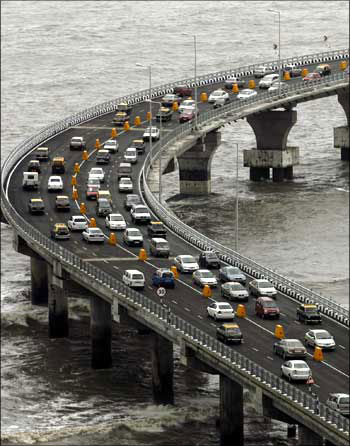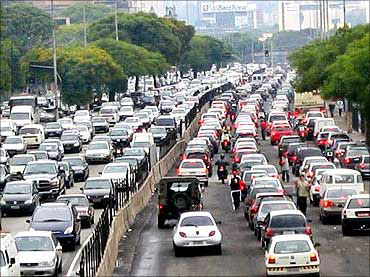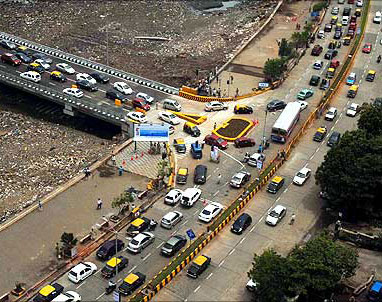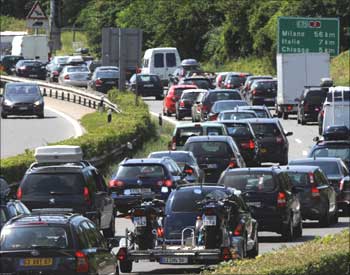
Traffic. It is maddening. It is protracted. It is increasingly harmful -- by every conceivable measure -- to individuals and businesses alike.
Every year, traffic wastes 58 supertankers full of fuel. Unfortunately environmental concerns, rising gas prices, and an economic slowdown have done little to weaken the chokehold of traffic on the life of cities.
What can you do? Build a smarter transportation which means better systems for rail, air, public transit and freight. These can improve our cities, our economy and our daily lives.
All in all, smarter transportation means advanced traffic management for air, land and sea. It is optimised around the traveller's experience, is connected across all elements of the system, and communicates its status in real time.
It fluidly interacts with the other systems of our planet -- from healthcare, to public safety, to commerce and more. This is so as we are increasingly coming to understand that our communities, cities and our entire nation are systems -- complex systems, systems of systems, systems that span both nature and human society.
In the future, smarter transportation will even apply advanced modelling to something as previously unpredictable as, say, the flow of volcanic ash across the Atlantic Ocean.
. . .

All of this and more is possible today, or soon will be. The progress of technology is only accelerating. Cities everywhere are battling an increase in demand and an inability to build sufficient infrastructure to cope.
The recent IBM Commuter Pain Study paints a grim picture of metropolitan-area commuters in many cities struggling to get to and from work each day, often with negative consequences.
For example, 57 per cent of all respondents say that roadway traffic has negatively affect their health, but that percentage soars to 96 per cent in New Delhi and 95 per cent in Beijing.
According to the survey, New Delhi's drivers have the fifth most painful commute among 20 global cities. Almost all of Delhi's respondents said that traffic had negatively affected their health and half said that driving makes them angry.
The Commuter Pain Survey polled 400 drivers in each of the 20 major cities in six continents. Based on the results, it compiled a Commuter Pain Index that ranks the emotional and economic toll of commuting in each city on a scale of 1 to 100 along 10 indicators, including commuting time, driving-related stress and the impact of traffic on work.
If it's any consolation, Beijing, with a score of 99 on 100, is much worse than Delhi as is Mexico City.
. . .

Johannesburg (97), Moscow (84) and New Delhi (81) complete the list of the five worst. Nearly all of Delhi's drivers -- 96% to be precise -- said traffic negatively affected their health. Almost two-thirds (62%) said traffic negatively affected their work or academic performance.
The question now is: what is to be done? More fuel-efficient cars, more public transportation, more ridesharing, more telecommuting are all good steps -- but hardly enough.
And it is clear that the traditional remedies for road congestion -- adding a lane or building a new road -- have proven to be just a temporary fix before congestion returns.
A number of estimates suggest that in both developed and developing cities, traffic congestion costs between 1 and 3 per cent of GDP. That's big -- and it's only going to increase.
In the cities of emerging markets -- such as India -- car ownership rates are skyrocketting. What if they reach the 75-90 per cent we see in OECD (Organisation for Economic Co-operation and Development) countries? Think of the strain on transport infrastructures.
We have no reason to believe that in the near future the number of cars on the road will decrease or that road improvement projects will significantly enhance the daily commute. Therefore, other steps are required.
. . .

We need to understand that traffic is not just a line of cars: It is a web of connections. A real solution will look at relationships across the entire road network and all the other systems that are touched by it: our supply chains, our environment, our companies, the way people and communities live and work.
And, technology can help. For the first time in history, digital and physical infrastructures are converging. As a result, we are now able to understand large, complex systems that previously resisted investigation -- systems as diverse as waterways, oilfields, and transportation networks.
Thanks to the proliferation of data-gathering devices on our roads and recent advances in business analytics -- large volumes of data can be quickly synthesized and actionable insights extracted that allow for active management of our transportation networks to keep people moving more efficiently.
Fortunately, today's technology can give us that kind of insight. Systems can provide transportation officials with detailed, real-time traffic information; sophisticated analytics of that information that can predict traffic jams; and thus planners can use the resulting insights to proactively deploy traffic management strategies that would minimize delays and congestion.
Some examples of interventions include changes to signal timings, dynamic toll adjustments, incentives to change mode of travel, incentives for changing time of travel, etc.
. . .

Such intervention can result in smoother traffic flow, reduced emissions and reduced delays. Around the world, governments are relying on this kind of technology, in addition to traditional methods, to make big improvements in their transportation networks.
For example, in Singapore, controllers receive real-time data through sensors to model and predict future traffic flows with 90 per cent accuracy.
Finally, we have to realise that this is not the problem of business, government, or commuters alone. It is a problem for all of us; and we must all work together to solve it.
It is IBM's hope that this report -- together with the conversations we hope it generates -- will contribute to that solution. This calls for collaborative leadership skills, and management systems that are architected for inclusion, collaboration and transparency.
For sure, the world will continue to become smaller, flatter and smarter as we move into the age of the globally integrated and intelligent economy, society and planet. The future beacons with enormous promise -- if only we seize it now, together. Are we ready to drive IT right and smart?
The author is vice president, public sector, IBM India and South Asia.